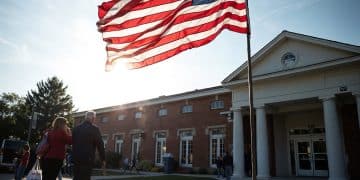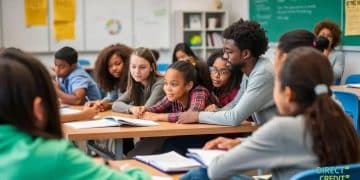Florida book ban law: Impact on education and society

The Florida book ban law was ruled unconstitutional, allowing for broader access to diverse literature in schools and encouraging educational reforms that prioritize inclusivity and critical thinking.
The Florida book ban law ruled unconstitutional in 2025 has sparked a wave of discussions among educators and parents.
How does this decision impact students and their access to diverse literature? Let’s delve into the details.
Overview of the Florida book ban law
The Florida book ban law aimed to restrict access to certain literature in schools, raising significant concerns among educators, students, and parents.
This law, implemented to protect children from what some deemed inappropriate content, has been met with mixed reactions.
Understanding the implications of this legislation is crucial for educators and advocates alike.
Key provisions of the law
This law outlines specific guidelines on which books can be included in school curriculums. The objective was to create a safer educational environment by limiting exposure to controversial subjects.
- Books deemed inappropriate would be removed from libraries.
- Teachers had to undergo mandatory training to identify offending materials.
- Parents were empowered to challenge books in the curriculum.
Despite its intentions, the law often sparked debates about censorship and educational freedom. Critics argued that it stifled creativity and limited students’ exposure to diverse perspectives.
They claimed that a well-rounded education includes materials that may challenge or provoke thoughtful discussions.
Challenges faced
In practice, educators faced numerous challenges in complying with the law. Many reported feeling uncertain about which materials were appropriate to use, leading to an atmosphere of caution in classrooms.
This hesitance created gaps in educational content available to students.
Teachers often avoided discussing important historical events, which meant that students missed out on opportunities to understand different cultures and viewpoints.
This lack of exposure led many parents to express frustration over the limitations placed on their children’s reading.
In summary, while the Florida book ban law aimed to protect children, it raised significant concerns about freedom of expression in education.
The conversation surrounding the law emphasizes the importance of balancing safety with the right to access information.
Arguments against the law
There are several key arguments against the Florida book ban law that have emerged from educators, students, and advocacy groups.
Critics believe that this law infringes on the rights of students to access a wide range of literature. By limiting the books available in schools, it potentially harms educational growth and critical thinking.
Impact on student learning
Opponents argue that restricting books can lead to a narrow-minded educational experience. Students benefit from exposure to diverse ideas and narratives.
When they engage with various perspectives, they develop empathy and a better understanding of the world.
Exposure to different cultures and viewpoints is essential, as diverse literature fosters critical thinking and meaningful discussion. However, limiting access to these resources can significantly hinder students’ academic growth.
This type of censorship not only affects individual reading choices but can also impact classroom discussions. Teachers often feel pressured to avoid certain topics, thus preventing necessary conversations about social justice, history, and identity.
Furthermore, it can create an atmosphere of fear, causing educators to self-censor.
Legal and ethical considerations
Many concern themselves with the legal implications of this law. Critics claim it violates the principle of free speech. The law gives significant power to individuals and groups who may not represent the broader community’s values.
- Challenges the First Amendment rights.
- Creates a slippery slope for future censorship.
- May lead to increased legal battles over educational content.
These arguments highlight the fundamental issues surrounding the Florida book ban law. It raises questions about the role of education, the importance of diverse viewpoints, and the rights of students and educators.
Implications of the ruling on education
The recent ruling declaring the Florida book ban law unconstitutional carries significant implications for education within the state.

Many educators and school administrators are relieved that they can now expand their classroom libraries without the fear of legal repercussions. This change can revitalize learning environments by allowing teachers to introduce a wider range of materials.
Broader access to literature
With the ruling, students will gain access to books that reflect diverse cultures, histories, and ideas. This improves not only their understanding of the world, but also their critical thinking skills.
Engaging with various viewpoints encourages healthy debate and discussion in the classroom.
Students can explore different themes, including social justice and equality, while the class curriculum now has the opportunity to include contemporary issues and various perspectives.
This approach encourages students to develop their own opinions through critical engagement.
Furthermore, the ruling allows teachers to discuss controversial topics openly, which is crucial for fostering a comprehensive education. This environment nurtures informed citizens who are prepared to engage in societal discussions.
Potential challenges ahead
Even with the ruling, challenges may arise in implementation. Some school districts may hesitate to fully reintegrate previously banned books. Concerns over backlash from certain community groups could lead to lingering hesitancy.
- Administrators might still face pressure regarding book selections.
- Teachers could feel unsupported when introducing sensitive topics.
- Ongoing debates about educational content may resurface.
Ultimately, while the ruling is a victory for educational freedom, the path to fully realizing its benefits will require continuous dialogue among educators, parents, and the community. Ensuring that diverse voices are heard in the classroom is essential for a well-rounded education.
Public reactions and protests
Public reactions to the Florida book ban law have been intense and varied. Many individuals and groups, including teachers, parents, and students, have voiced their concerns about the negative impact of such censorship on education.
Across the state, protests have emerged, highlighting the community’s desire for change.
Grassroots movements
Grassroots organizations have played a significant role in mobilizing people against the book ban. These movements focus on advocating for freedom of expression and informed educational choices.
They often organize rallies and community discussions to raise awareness and foster dialogue.
Local book fairs promote diverse literature, while community forums create spaces for discussions about censorship. At the same time, campaigns highlight personal stories affected by the law.
Through these efforts, activists aim to show that access to diverse literature is crucial for young minds. They believe that literature broadens students’ understanding and prepares them to navigate a complex world.
School walkouts and demonstrations
School walkouts have also become a common form of protest. Students across the state leave their classrooms to demonstrate against the ban. These actions captivate local media attention and the public, bringing the issue to the forefront of community conversations.
Students carry signs advocating for their right to read, while young activists use social media to organize events. These demonstrations highlight the voices of future generations.
The activism surrounding the Florida book ban law emphasizes the importance of student agency and the desire for an education that reflects the diversity of society.
Engaging in such protests helps students develop a sense of responsibility and community engagement, skills they will carry into adulthood.
Future of educational policies in Florida
The future of educational policies in Florida is currently in a state of flux, especially following the ruling against the Florida book ban law.
As educators, parents, and advocacy groups push for change, many are hopeful for reforms that prioritize student learning and access to diverse literature. This may set the stage for more inclusive policies in schools.
Potential reforms on the horizon
Several reform ideas are being proposed to reshape educational policies moving forward. While challenges remain, there is a clear demand for greater inclusivity in curriculum development.
Stakeholders are calling for a system that celebrates diverse perspectives and encourages critical thinking.
There has been a development of guidelines for inclusive curricula, along with training for teachers on handling sensitive topics. Additionally, there is increased involvement of parents and communities in educational decisions.
These reforms could ensure students have the chance to engage with literature that reflects a variety of experiences, which is crucial for their emotional and intellectual growth.
Schools may need to reevaluate what constitutes appropriate reading material to align with evolving social values.
Impact of community engagement
Community engagement will be key in shaping the future of educational policies in Florida. The active participation of parents, teachers, and students can create a robust dialogue about the importance of an inclusive education.
Involving these groups in discussions can help to identify what works best for local communities.
Partnerships between schools and local organizations have been established, while parent-teacher associations advocate for a broad range of resources. Additionally, student-led initiatives promote reading diversity.
The emphasis on community collaboration is vital. This collective approach can lead to educational reforms that reflect the needs and values of the community, creating better outcomes for students.
FAQ – Questions About the Florida Book Ban Law and Its Impact
What is the Florida book ban law?
The Florida book ban law aimed to restrict access to certain literature in schools, raising concerns about censorship and educational freedom.
How did the public respond to the book ban law?
Public response involved protests, grassroots movements, and strong advocacy for educational reforms that promote diverse literature.
What implications did the ruling against the law have for education?
The ruling opens the door for broader access to literature, encouraging a curriculum that reflects diverse perspectives and supports critical thinking.
How can community engagement influence future educational policies?
Community engagement fosters dialogue, allowing parents, educators, and students to collaborate on shaping policies that truly represent their needs and values.





